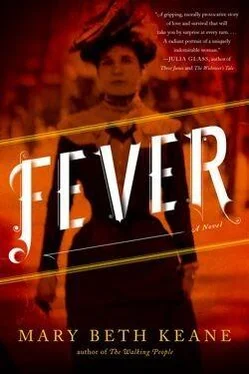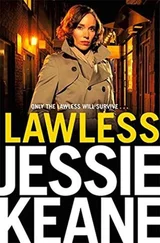“She works at a laundry? Where?”
“It’s almost on Washington Square.”
“Which side? What street?”
“Mr. Briehof!” Mrs. Borriello was calling for him from the bottom of the dark stairs.
“Didn’t you used to live upstairs?” the boy asked.
Mrs. Borriello shouted again.
“He needs firewood,” the boy said. “Better go in and get some of ours. She wants me to go down to her.”
The boy ran down the stairs, shouting something to his mama all the way, and Alfred turned and put his hand on the Borriellos’ doorknob. He pushed the heavy door and listened as the bottom brushed the floor like all the doors did in 302, leaving little arcs of scratch marks as welcome mats to every room. The wood was stacked by the stove, twigs, parts of branches, bits and pieces they must have collected from around the city. Alfred went over and selected a few of the heftiest pieces. When he turned he noticed the cot, and on the cot two folded blouses. On the windowsill above the cot was a woman’s comb, a collection of hairpins, hair powder, a tub of cream. He recognized the comb and the brand of cream. He left the wood on the Borriellos’ table and sat on the edge of Mary’s bed. He didn’t dare touch the blouses — it was bad enough he’d mussed the bed — but he studied the collars for signs of her skin, some detail that might have been caught in the material. He sniffed them, then leaned over, his head between his knees, to peer under the cot, searching for some lost thing she might have given up on and which he could keep, but there was nothing except dust. He thought about leaving her a note, the long-overdue letter she’d wanted so badly when she was on North Brother, the empty tin of tobacco from his pocket that she would know was his, knowing his brand and knowing they would tell her the story later, how he’d come knocking and how he’d spent a few minutes in the flat, alone. He heard the boy’s light steps on the stairs, two at a time, so he went to smooth the quilt, but then decided, no, he’d leave it the way it was, let her imagine him sitting there, thinking about her. He gathered the wood, and by the time he had it in his arms, the boy was there with his brother, to tell him that their mother had banned them, had sent them upstairs with instructions to close their door and not to come down again. And if she wasn’t home by supper, they were to be good boys and boil themselves an egg and clean up after and go straight to bed. There was something in the building, and she didn’t want them around until they figured out what it was.
• • •
Driscoll was worse. His fever was high and he complained of pain in his back. When he coughed into his pillow he left behind spots of blood. He couldn’t hold the teacup Mrs. Borriello had filled with broth so she sat on the edge of his bed and lifted it to his mouth. “Slow,” she said. “Little sips.” At moments he seemed to feel better, but then he was again moaning and clutching at the bed as if it were just a matter of getting deeper, of burrowing himself away from his rooms into a cooler place underneath it all, where he might find some relief.
“Should I run out to get medicine? A doctor? He has a little money, you know.”
Mrs. Borriello peered at Alfred. She seemed to want to make herself into a wall between the two men.
“I mean for the doctor. I think he could pay a doctor. And I think a doctor has to see a sick person anyway, even if he can’t pay.”
“I think that’s true.”
“Because I’ve never seen something like this. Have you?”
“Yes. The blood on the pillow. The coughing with fever. I saw it one time.”
“Okay then. I’ll go.”
“Where?”
“I don’t know. I’ll go up and ask Fran. She had the doctor come once. For one of the children.” He wanted to ask where Mary was, what time she’d be home.
They heard the scrape of the door being slowly pushed open. “Mama?” came a boy’s voice. Mrs. Borriello was across the room in an instant, pushing her youngest son into the hall and trying to shut the door on him. She shouted at him in Italian, but still he tried to insert the toe of his boot in the door. As they struggled, Alfred stepped out into the hall and lifted the boy under the arms.
“Go, go, go,” Mrs. Borriello shouted at both of them, and then added something in Italian.
“I’m staying with my mama,” the boy cried as Alfred carried him to the stairs.
“You have to go up,” Alfred said.
Mrs. Borriello shouted again.
“She says to tell everybody, don’t come down here. Bad enough there’s the two of us already. Three of us including me. She says she’ll kill me later. To you she says stand back from the door when you talk to Miss Fran about the doctor. Want me to do it? She says we could be breathing it now, whatever it is.”
As Alfred climbed the steps with one hand bracing the boy by the upper arm, he thought of Liza and how she’d worry but there was nothing he could do and really it would be the wrong idea to go home to her now and carry this thing to her, to Samuel. She’d understand that he had to stay in 302 until he saw this thing through. And if Mary arrived home later and the boys told her everything — how Alfred had searched for her, how he’d stayed on to help their mama, how he’d rushed down the stairs with their wood and kindling to help Mr. Driscoll — and if hearing about all that made her want to see him again, to talk only, and if talking softened her toward him enough so that she didn’t object when he touched her, then he couldn’t help that, either.
The one doctor Fran knew of had moved uptown, but Mr. Stern from the third floor knew of a good man who made house calls. Jimmy Tiernan was elected to go to West Sixteenth to fetch him, and as he rushed down the stairs and out onto the dark sidewalk, Patricia looked after him, relieved that her man was traveling farther away from whatever poison was dwelling at Mr. Driscoll’s. First thing in the morning she was going to bring their children to her sister’s in New Jersey and stay there until this thing passed.
Jimmy Tiernan didn’t return until nearly eight o’clock in the evening. He shouted through Driscoll’s closed door that the doctor would be there shortly. Alfred and Mrs. Borriello took turns sitting with Driscoll. A few times, Alfred tried to raise the subject of Mary. When it was Mrs. Borriello’s turn to sit with Driscoll, Alfred sat in the chair in the corner of Driscoll’s bedroom. “Your son said Mary works at a laundry now?”
Mrs. Borriello glanced over at him quickly, and simply nodded.
“Does she like it? She was a laundress before, you know. When I met her.”
When Mrs. Borriello showed no indication that she’d even heard him speak, he knew that there was no point in trying. When it was his turn to sit with Driscoll he patted the old man’s head with the compress and realized he’d never before been around anyone as ill. At nine o’clock came a strong knock on the door and an unfamiliar man’s voice announcing himself as Dr. Hoffmann. Relieved, Alfred jumped up to open the door.
Dr. Hoffmann asked about Driscoll’s first symptoms, how long he’d been in the state he was in, what his health was before he came down ill. He pulled the older man up to sitting, and Driscoll fell toward the doctor’s lap like a sleeping child lifted from his crib by his mama. The doctor listened to Driscoll’s chest, took his pulse, and then told Alfred to go straight to the nearest grocer and ask them to call for an ambulance. As Alfred rushed down the hall, he heard a voice behind him.
“How is he?” Mary asked. She was standing two steps above the second-floor landing. She was wearing a dark green dress that buttoned in a double-breasted style up to her throat. She was as familiar to him as his own reflection in the mirror, and he saw clearly how silly he’d been, playacting with another woman, a woman he barely knew, and who barely knew him, when his life was here, standing on the landing above him.
Читать дальше












